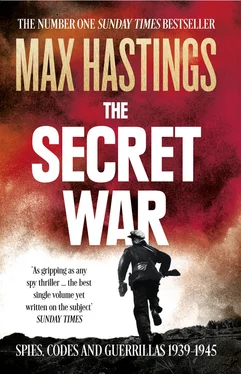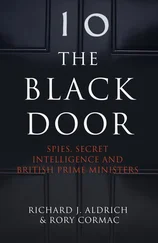1 ...7 8 9 11 12 13 ...47 It is easy to catalogue the shortcomings of MI6. Like most of its sister services on the Continent, in 1939 it commanded little respect in high places, and had small influence on policy-making. It seems necessary to go beyond this, however, and pose the question: what might its spies have usefully discovered, granted more resources and cleverer people? The likely answer is: not much. MI6’s reporting was matched by a daily bombardment of newspaper headlines, both showing beyond peradventure that Germany was rearming. More accurate and detailed information about Hitler’s armed forces would have been useful to the War Office and Downing Street, but the critical issue, the vital uncertainty, was not that of Germany’s capabilities, but rather that of its intentions.
It seems quite misplaced to blame wrong or inadequate intelligence for the calamitous failure of Britain and France to deal effectively with the Nazis. Both nations correctly assessed the options at Hitler’s disposal for onslaughts East or West. MI6 can scarcely be held responsible for failing to anticipate exactly where or when he would attack, because he himself was an opportunist who reserved his decisions until the last moment. Sir Alexander Cadogan, permanent under-secretary at the Foreign Office, wrote much later: ‘We were daily inundated by all sorts of reports. It just happened that these were correct; we had no means of evaluating their reliability at the time of their receipt. (Nor was there much that we could do about it!)’ Rather than a failure of intelligence, what mattered was the democracies’ failure of will – the refusal to acknowledge that the Nazis constituted an irreconcilable force for evil, which the very survival of European civilisation made it essential to destroy, rather than to bargain with.
Most of Hitler’s opponents inside Germany, and indeed across Europe, were communists who considered the Russians the only people both willing and able to challenge fascism. Everything said and done by the British and French governments before the outbreak of war confirmed anti-Nazis in that view. Thus, people who wished to contribute to undoing Hitler offered information to the agents of Moscow much more readily than to those of London or Paris. It was anti-Nazis’ poor opinion of Neville Chamberlain that made them reluctant to look to his country as a shield against Hitler, not their perception of MI6.
It is far more plausible to argue that Britain’s diplomats should have exposed the dictators’ intentions than to suggest that its spies might have done so. In peacetime, good intelligence officers can assist their governments to grasp the economic, military and technological capabilities of prospective enemies, but it is unusual for a secret service to provide a reliable crib about their intentions. Top diplomats ought to have been cleverer than intelligence officers. Their training, experience and access to sources should have empowered them to assess the world with greater wisdom than Broadway’s old soldiers. It seems far more discreditable that Henderson, Britain’s ambassador in Berlin, was willing for so long to think well of Hitler, than that MI6 with its meagre resources was unable to tell the government what the Führer would do next. If a German anti-Nazi had turned up on Henderson’s embassy doorstep, offering inside information, it is likely that he would have been sent packing.
Admiral Sir Hugh Sinclair – ‘C’, as the head of the secret service was always known – died suddenly in November 1939, having occupied his post for sixteen years. Winston Churchill, as First Lord of the Admiralty, pressed the claims of the obscure Gerhard Muirhead-Gould, a former naval attaché in Berlin, to succeed him. Instead, however, Sinclair’s deputy, forty-nine-year-old Guards officer Brigadier Stewart Menzies, convinced the Foreign Office and the prime minister that he had been anointed by the dying Sinclair as his rightful successor. He thus inherited a mantle that he was widely considered ill-fitted to wear. The ninth Duke of Buccleuch, who had been Menzies’ fag at Eton, told a friend that ‘C’s’ contemporaries were mystified ‘how so unbelievably stupid a man could have ended up in such a position’. Hugh Trevor-Roper sneered at Menzies as ‘a thoughtless feudal lord, living comfortably on income produced from the labour of peasants whom he had never seen, working estates which he had never visited’.
This was hyperbolic, as were most of the historian’s private judgements on his colleagues, but it was true that Menzies had learned his craft in a bad school – not so much Eton as service on the staff of Brigadier John Charteris, Field-Marshal Sir Douglas Haig’s egregious intelligence chief on the Western Front. Menzies’ DSO and MC showed that he did not lack courage. His social skills sufficed to win the confidence of Maj. Gen. Hastings ‘Pug’ Ismay, soon to become Churchill’s chief of staff, and in some degree that of the prime minister himself. But ‘C’ knew little of the wider world he aspired to spy upon, and tolerated in Broadway a bevy of even less inspired subordinates.
Decisions were powerfully influenced by his two joint deputies, Valentine Vivian and Claude Dansey, who hated each other. Vivian was a former Indian policeman who was credited with a major role in frustrating the machinations of the Comintern – the Communist International – in South America and the Far East; he was also an office intriguer of energy and skill. Meanwhile Dansey went briefly to Bern in September 1939, to try to organise intelligence links from neutral Switzerland to Germany. A plentiful supply of fraudulent informants emerged, of whom by no means the most imaginative was a German refugee in Switzerland who used his nation’s Army List to fabricate a mobilisation programme which he attempted to sell. One of the few useful sources Dansey identified was an Austrian Pole, Count Horodyski. He, in turn, introduced the British to Halina Szymańska, wife of the former Polish military attaché in Berlin, now an exile in Switzerland. She became one of MI6’s most useful conduits, with connections in the Abwehr. Dansey thereafter returned to London, where he exercised a powerful influence on the wartime fortunes of MI6, mostly to its detriment.
During the years that followed, Britain’s secret service recruited numbers of outstanding officers and agents, who did some useful and a few important things for the Allied cause, but its chieftains inspired only limited respect. The stimulus of war would generate an intelligence revolution, and give birth to one of Britain’s most dazzling achievements. However, this did not take place in Broadway Buildings, but instead outside a dreary suburban town in Buckinghamshire.
3 THE RUSSIANS: TEMPLES OF ESPIONAGE
Just before noon on 23 May 1938, Pavel Sudoplatov of the NKVD strolled into the Atlanta restaurant in Rotterdam and greeted a Ukrainian nationalist leader whom he had come to know well, in the guise of being a sympathiser with the man’s cause. Sudoplatov, newly arrived on a merchant ship from Murmansk, presented the man with a handsome box of chocolates adorned with the Ukrainian crest. The two chatted for a few moments to arrange a further rendezvous, then Moscow’s agent bade his companion farewell and moved on. He was a safe distance down the street by the time he heard a sharp explosion. A timing device had detonated a bomb inside the box, killing the nationalist. This was a typical Moscow Centre *operation of the period, one thrust in the relentless campaign to liquidate state enemies, real or supposed traitors. Sudoplatov’s success earned him a four-hour meeting with Stalin’s foremost secret policeman, Lavrenti Beria, who marked him for bigger things, such as managing the assassination of Leon Trotsky.
Читать дальше












